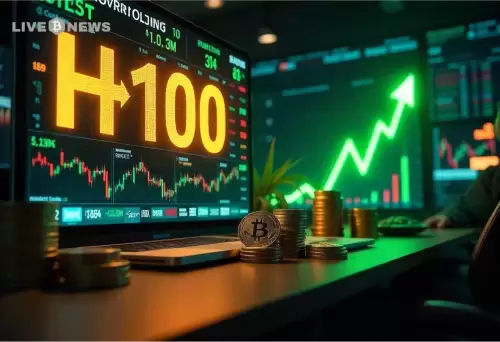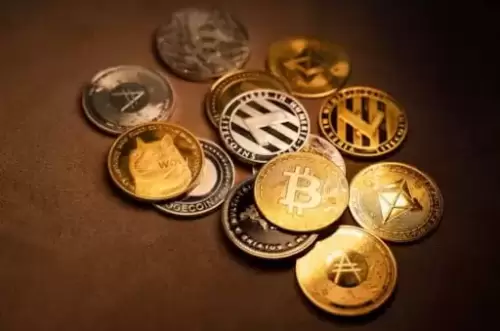 |
|
 |
|
 |
|
 |
|
 |
|
 |
|
 |
|
 |
|
 |
|
 |
|
 |
|
 |
|
 |
|
 |
|
 |
|

The stock market is sliding further on Monday as traders process more bleak earnings reports and the president's tariff plans continue to weigh on investor sentiment.
May saw a dramatic shift in the market's trajectory. After a strong rally that pushed the major indexes to new all-time highs in January, the bulls ran out of steam. By May, the market entered a correction, with the S&P 500 losing more than 20% from its 52-week high.
Tariffs are one of the main topics that traders are keeping an eye on. They may also bring on a recession or exacerbate inflation, both of which could spell further downside for the market in the short term as well as in the long term.
But Bitcoin (CRYPTO: BTC) is showing some very interesting behavior at the moment. It might even be confirming a hypothesized part of its investment thesis that wasn't fully supported by the evidence before. And if that is indeed what it's doing, it's another reason to load up on the coin.
Is this the proof of the coin being a safe asset?
One of the main ideas in favor of buying Bitcoin is that it's an asset that isn't tightly correlated with the traditional financial sector. While it's questionable whether that's actually true, given that many major banks now hold it, the point is that if it isn't correlated, it shouldn't go up or down based on what's happening in the stock market or the global economy. Therefore, it could be an effective hedge against problems in the markets or turbulence in the world.
On the face of it, the idea could work. Bitcoin isn't tied directly to economic fundamentals, and its value is pretty much exclusively derived from its inherent scarcity, as well as the fact that there's an army of die-hard evangelists willing to buy it at practically any price. But, at least until recently, the historical data was shaky.
In its lifetime, Bitcoin has experienced numerous dramatic declines that shaved off 80% of its value, or even more. Recovering and powering beyond those troughs took at least a few years on average. Nobody would consider that a safe asset to hold when times get rough. That paradigm might be changing, though.
Consider this chart depicting Bitcoin's performance against exchange-traded funds (ETFs) that track the major stock market indexes since March 22:
Notice anything? While every major grouping of stocks was getting hammered by the news of looming tariffs, Bitcoin's price actually recovered stronger after a deeper initial dip. It didn't collapse as one would expect of a speculative asset during the period of peak pessimism, and that's one key factor that warrants deeper exploration.
For now, consider this next chart looking at moves since the presidential election.
Bitcoin continued to gain value during the period of anxiety starting after the election and leading up to the confirmation of the market's worst expectations about the trade war in April. But what does that mean, and why is it so important in the bigger scheme of why the coin is worth buying and holding?
In short, if Bitcoin holds up when everything else is struggling, it means there's some meat on the bone of the argument that it's an uncorrelated asset relative to the traditional financial system. In other words, it could be finally showing its capability as a safe asset, and to live up to the digital-gold moniker that's long been more of an aspiration than a fact. Until now, aside from times when its price was driven upward primarily by its own supply dynamics, the coin appeared to be highly correlated with the broader market during declines, like during the 2022 bear market for instance.
There's a clear action to take
The real test for Bitcoin's safety is still on the way. There might be a lot more turbulence in the markets coming soon, especially if the tariffs have damaging economic effects around the world.
If there's a recession caused by the tariffs in the U.S. or elsewhere, it's inevitable that some holders will need to liquidate their Bitcoin to pay the bills. The question is whether they would do so as one of the first assets they sell, or as one of the last. It isn't possible to answer that question with clarity at the moment, and it won't be possible until there is more data.
But even in that bearish scenario, it's important to note that there can only ever be 21 million Bitcoin mined. And the difficulty of mining it will only increase over time, with an ever-increasing amount of effort yielding lower and lower returns. So, the core value-generating mechanism of scarcity is going to grind onward even if the price suffers during a tough economy. It's worth buying today at its current price to get the upside from its long move toward being in shorter supply.
But imagine if
免責事項:info@kdj.com
提供される情報は取引に関するアドバイスではありません。 kdj.com は、この記事で提供される情報に基づいて行われた投資に対して一切の責任を負いません。暗号通貨は変動性が高いため、十分な調査を行った上で慎重に投資することを強くお勧めします。
このウェブサイトで使用されているコンテンツが著作権を侵害していると思われる場合は、直ちに当社 (info@kdj.com) までご連絡ください。速やかに削除させていただきます。




























































